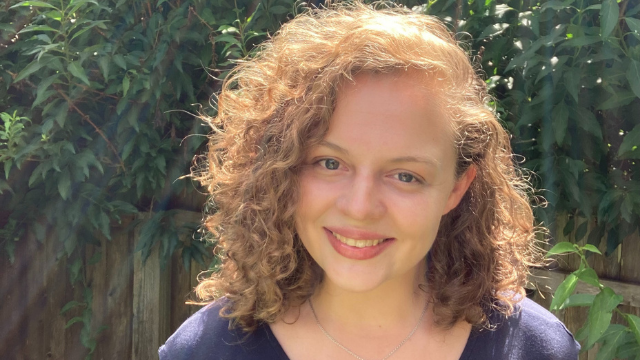
Barracuda Graduate Student Profile: Bailey McLaughlin
By Stefania Irene Marthakis
Bailey McLaughlin is a Ph.D. student in Ecology and Environmental Sciences at the University of Maine. McLaughlin’s interest in big global change questions regarding how biodiversity might be impacted by climate change and other global change drivers lead her to work with Brian McGill, Professor of Ecological Modeling in the School of Biology and Ecology with a joint appointment at the Sen. George J. Mitchell Center for Sustainability Solutions.
As a graduate research assistant in McGill’s lab, McLaughlin is part of the NSF EPSCoR RII Track-2 grant: Biodiversity and Rural Response to Climate Change Using Data Analysis (Barracuda), which asks large-scale questions on how species might be impacted by and respond to global change.
McLaughlin grew up on Long Island—where her dad is a part-time shell fisherman—exploring the different corners of the marine environment. Over the years, McLaughlin has seen that system change when she goes back home.
“I got hooked on using science as a tool to understand the environment, which was interesting to me from the ecology side but also because the traditions of my family were tied to that landscape,” McLaughlin said.
Now working within terrestrial ecosystems on the Barracuda project, McLaughlin is helping to aggregate data for target organisms (e.g., trees, birds, agricultural crops) as well as climate and data layers that will be used to help create these short-term forecasts.
“We need occurrence data, but we also need additional information for the mechanistic models, so we’re getting more species-specific data about life history, like population and age-to-maturity data, to understand more so how these specific species might respond,” McLaughlin explained.
As an ecologist, McLaughlin is interested in the biodiversity aspect of Barracuda, but knows the human dimension is a critical component of the project.
“Once we know what biodiversity is going to do, as well as the repercussions of climate change on the landscape, we can look at incorporating the human dimension to that in terms of adaptation and how people, who rely on these various ecological resources, might respond,” McLaughlin stated.
Ultimately, McLaughlin’s goal is to be a professor at a research institution, to teach and continue to do research, to design a research program like Barracuda that combines interesting science with an interdisciplinary approach.
“I do enjoy interdisciplinary work. I think it’s exciting to see how other people think through similar problems,” McLaughlin added.
“Ecology as a discipline is pretty broad. There’s a lot of different things that people work on, so even within the discipline, sometimes I have to remind myself what a specific term means for a specific sub-discipline, which I think is a great exercise in broadening my perspective and understanding. I might think about something in a particular way, but an ecologist that works in a different system or at a different scale might think about it in a slightly different way,” McLaughlin explained. “I think when you add other disciplines into the mix, there is a similar effect. It really helps to open your eyes to other ways of thinking, doing things, and approaching problems. It allows you to add your layer of expertise or specialty onto theirs as well.”
